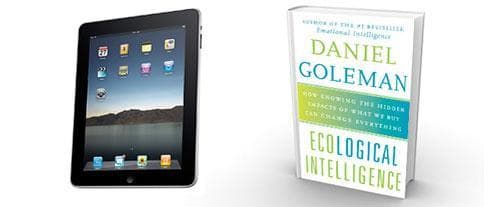Advertisement
Sizing Up Your Green Footprint
Resume
Every product we buy has a footprint, an environmental footprint, but those footprints are not easy to see.
There’s the object itself. The transport it takes to move it. The energy it took to make it. Exotic ingredients and manufacturing. And what it takes to be rid of it once it’s done. That’s quite a trail.
So what’s really greener? iPad or book? Stainless steel or plastic? Incandescent or halogen?
This Hour, On Point: the ecological footprints of what we buy. Plus, later this hour, a big court ruling on “net neutrality.”Guests:
Daniel Goleman, science journalist and psychologist. He's author of "Emotional Intelligence," "Social Intelligence," and "Ecological Intelligence: How Knowing the Hidden Impacts of What We Buy Can Change Everything" (with an accompanying CD). His op-ed, in this weekend’s New York Times, was "How Green Is My iPad?"
Dara O’Rourke, Professor of Environmental and Labor Policy at UC Berkeley and founder of GoodGuide.com, a website that rates over 65,000 products by their personal, social, and environmental impact.
More links:
Check out Grist's guide to green iPhone apps.
Closing Segment:
Yesterday, a Washington D.C. appeals court ruled that broadband providers do not have to give equal Internet access to everyone. The cable company Comcast argued that a service called BitTorrent, which allows users to exchange large, often pirated, video, should not be allowed to slow down everyone’s Internet service. The FCC argued that BitTorrent should not be discriminated against. The court sided with Comcast, throwing into question the FCC’s ability to regulate the Internet, and keep it equally open to all.
We speak with Arik Hesseldahl, senior technology reporter for BusinessWeek Magazine.
This program aired on April 7, 2010.
